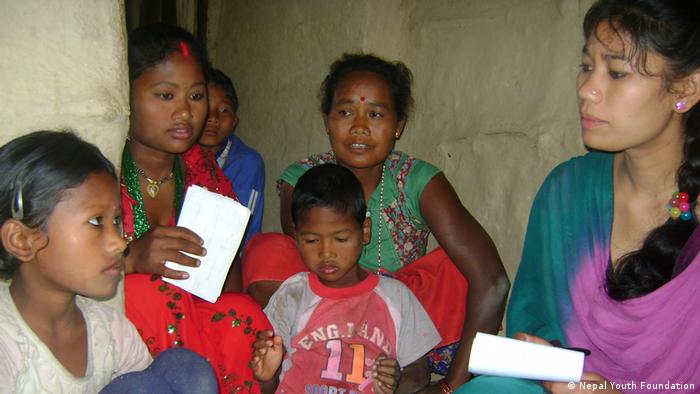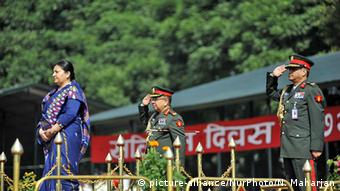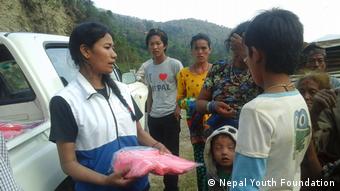Child Urmila could hardly be. At the age of six, she was enslaved, toiled for the rich families. The experience has scarred, but not broken. It has announced a whole System in Nepal the fight.

Basically, it reports you have heard of the Lucky ones. They had only been beaten, insulted,. Others have experienced much worse. Urmila Chaudhary tells the calm. It is a statement of fact. She speaks softly but with a firm voice when she tells about her life. A life that existed for many years, almost exclusively from the torment and loneliness.
Urmila is now 27 years old. Almost twelve of which she spent in captivity, as thralls and maid-rich house of lords in the Nepalese capital of Kathmandu. It was a so-called Kamalari, one of tens of thousands of girls from the tribe of the Tharu, which are sold by their parents out of economic necessity. Almost seven percent of the population in the Himalaystaat are Tharu. They are poor, living from agriculture, but that alone is not enough. The Tradition of sending daughters for money in the city developed over several centuries. The parents brought an additional income and one less mouth to feed. The girls are being brutally deprived of their Childhood. Kamalari means translated “hard working woman”, but actually it’s about children.
The fight against rigid structures
This topic was on the borders of the country of Nepal is also known to a wider Public – and that the Kamalari System is prohibited since 2013, even by law and under penalty, to a large extent with Urmila Chaudhary.

Urmila and the other former household slaves from the Freed Kamalari Development Forum have every reason to be proud of their achievements
For ten years she is free again. Since then, to be denounces, informs you and goes on the road. She tirelessly works to ensure that other girls have the same suffering as you. She is an activist, founds his own organization, exempt thousands of other household slaves, and allows you to with the help of donations a second Start in life. And, as a result of social and political resistance will not stop.
Alone in the city
Today, she is a campaigner. At the time she was a small child.
“On the day I was sold by my family, I can hardly remember,” she says. “I was too young. I know that my father was very sick. My parents had no money to leave him in the hospital to treat.” At this time comes a stranger man through the village. He wants to buy Urmila as a maid for the household of his daughter. The man offers an annual salary of 4000 rupees, as of today, the equivalent of 34 euros.
Enough money to seal Urmilas fate. Just like before, the of her two sisters. Also you are already working somewhere in the capital as a Kamalari. Urmila also goes to Kathmandu to a family with two children. She works 14 to 16 hours per day, you must run the household, cleaning and cooking. At first she is too small to be able to at all in the pots look, so she climbs on the stove and prepares the food. In addition, you must take care of the Little ones.”The one kid was my age, the other a little older than I am. I had to bring it to school every day and carry bags. It was physically very hard.”

“Urmilas empathy in dealing with liberated child slaves is impressive,” says Irene Jung, Terre des Femmes
Even harder, however, is that the children at the gate and may even not go in. Urmila wishes for even then nothing to be able to go to school. A dream, unattainable. The differences between himself and the children of the family feels every day. “When I saw the mother gave them food, and sometimes affectionate with the spoon fed, then I felt so differently than you. These two had all they could play, were allowed to be children. Why can’t I?”
Irrepressible Thirst For Knowledge
The loneliness is bad, especially at night. Then Urmila is crying himself to sleep. It holds on to the idea that they can one day return to her family. “I never lost hope. I could neither read nor write. But I was always convinced that I would make something of my life. Not only for myself but also for other Kamalari-girls.” It is something like a fight. Urmila has a lot of. And she is inventive. She asks the children in your house, gentlemen, what exactly are you doing in the school. And asks you to explain it to her. As she learns the ABC.
Eight years in the first family, then it is passed on. In the budget of a single woman. There it is even worse. Urmila is completely isolated, you get rotten food, the lady is shouting at them often. Urmila must not look her once in the eye. The woman is a high-level politician.
Homecoming after more than a decade
For your own family, Urmila is allowed to have no contact, for years. And the promised money, the 4000 rupees annual salary, is paid to the parents only in the first two years. “There was nothing you could do about it. You would have to demand never dared it. Tharu are very obedient and dutiful people.” She says, almost apologetically.

Since 2015, there is a woman with Bidhya Devi Bhandari, for the first time in the state in Nepal, however, of equal rights, the country is still far away
That Urmila can return after almost twelve years back in her village, thanks to a coincidence. She sees her brother on TV, he takes part in a Demonstration against forced labour. Urmila begs the politician to allow her a Meeting with him. Initially, the company refuses to give their consent. But Urmila is adamant. You won’t let go, even to stop to eat. Finally, your mistress agrees. You, however, to accompany Urmila.
A few weeks later, the mistress granted her the permission to go on a holiday together with her brother home under the condition that she comes back. “But then I am not returned. I couldn’t, it was like a prison.” In spite of everything, she had to go through: as of today, Urmila has a bad Conscience, because she is simply gone.
Taboo topic, and a question of guilt
The Moment she sees her mother again for the first Time, is difficult. You have actually just cried. About their experiences during the time as a Kamalari, she has not spoken to this day with their parents, not in front of it. “I don’t want to do that to you. It would hurt you to hear how I was treated. A little bit of, you know, because the media you talk about me in the reports and other people on me. But I never told you something.”
Urmila takes her parents. “You have my sisters and me to be sold, they had no idea what would await us. For them it was normal to give their children away. For us that was Tharu Yes Tradition for generations.” Whether it is really so simple? On the question of whether or not she has taken her parents this step really never evil, she admits: “Yes, sometimes I am very angry because I just lost my Childhood. I couldn’t grow up with the love of my parents.” Such thought experiments but to move away. And to say that their parents simply had no other choice.
Give up? – no Option
Urmila has returned to their freedom. But she wants more, she wants a life. The one that she has always dreamed of. It has realistically little Chance. She is 17, has never attended a school and would like to be a lawyer. It’s just making its way, undeterred, continues with much younger children in the class, stand astonished glances and curious questions. In addition, it builds under the umbrella of the Nepal Youth Foundation, even a private organization, financed by donations, “Freed Kamalari Development Forum (FKDF)”. And other get out of the enslavement. “It is incredible what she has achieved everything,” says Irene Jung of the Organisation Terre de Femmes. You know Urmila for years. Together with other organizations, the FKDF has released within the last few years to 13,000 girls.

Urmila does not want to give rest until the last of the former Kamalari are exempt
“They are comprehensively drawn through the villages, and asked: what is the family, there are as many daughters and where are they? They were very insistent, made a census and found out where the girls are missing.” Specifically you control, for example, intercity buses, looking after unaccompanied young girl on the way in the cities.
Moreover, they lead to the villages of theatre pieces that represent their own experiences of the show. So you want to show parents what to expect to keep their daughters actually in the house. Again and again it came, that mothers or fathers come to the idea to them and addressing them directly, reported Urmila. “You say My daughter is also a Kamalari. I had no idea what that means. Please help me rescue you.” Urmila games in these performances, by the way, the role of the mistress, reported by Irene Young. Maybe the way to process the experiences.
Long-Term Goals
How many Kamalari, there are still today, nobody knows exactly. “According to official estimates, there are only about 150 girls,” says Irene Young. Observers assume, however, that there are actually significantly more. And even if the Kamalari System is abolished since a few years, officially, have not changed the structures of society are still fundamental. The aim of Urmila is not for a long time.
Those girls have you and the others come out, after their liberation, to continue support to education and training programs. “Urmila wants to change the basic conditions for something, and the girl’s economic prospects,” explains Irene Young. “That’s why they have taken a large project. This is the build-up of 40 Cooperatives and micro-credit for 6000 former Kamalari.”

Urmila also helps in other emergency situations, as here, after the severe earthquake in the spring of 2015
In particular, public commitment – Urmila was a very quiet man, thoughtful and reflected, so Young. “This combination, coupled with so much clout and Power that is incredible. She has a huge empathy, and so much empathy. You can tell every Time, when you see how they deal with the young girl who freed you.”
Big Ambitions
Urmila has a lot of made the seemingly impossible possible. For others but also for themselves. She has learned to read, Write and Count. She speaks English, has rescheduled a high school diploma. She has just attended the entrance examination for the University. If it is, can you start in the fall to study law.
A few days ago, Urmila Chaudhary was awarded for her commitment in baden-württemberg, Esslingen with the International human rights award of the city. The future that she had never actually, is now in front of her. She is proud of her education, it shows. But is she happy? Urmila hesitates for a Moment. No, she says then. As a happy people they would not call. “But at least today I feel again as a human being.”